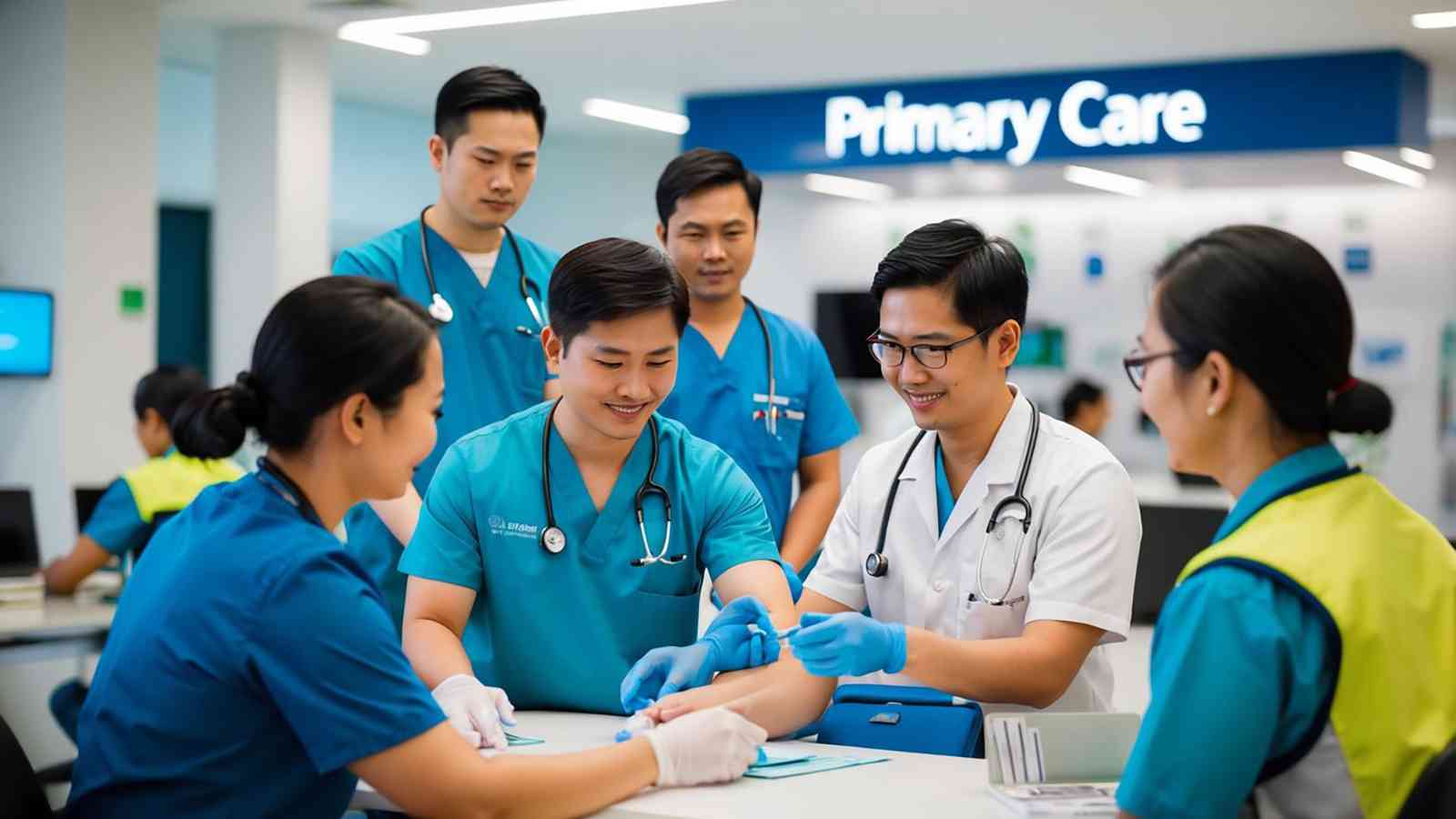
Singapore’s healthcare system is evolving to support workers better. The Primary Care Plan (PCP) is a new scheme to ensure quality and affordable primary care for eligible workers. This means workers can get medical attention when they need it, and not get hit with unexpected healthcare bills.
The PCP is now mandatory for certain employers. It covers workers in sectors like Construction, Marine shipyard, or Process (CMP). This affects thousands of employers and workers in Singapore. The aim is to ensure everyone can get the care they need without worrying about high costs.
Under this plan, workers can visit MOM Medical Centres or other approved clinics near where they live or work. This makes it easier for them to get help when they’re sick or need a check-up.
These clinics often provide telemedicine services, so workers can get care even remotely. The PCP is a big step forward for Singapore’s workforce.
Key Points
PCP offers affordable primary care for eligible workers in Singapore.
Employers must purchase PCPs for certain workers including work pass holders like Work Permits and S Passes.
Workers can access medical services through approved clinics near their homes or workplaces, tele consultation options and mobile clinical teams.
The Primary Care Plan (PCP) is a new healthcare scheme in Singapore. It aims to provide affordable and accessible medical care for certain groups of workers.
The Primary Care Plan (PCP) is a healthcare program to provide basic medical services to eligible workers in Singapore. Its objective is to ensure workers have access to quality primary care at a fixed cost. The PCP covers:
Chronic medical consultations
Wound dressing and basic treatments
Telemedicine services
Statutory medical examinations for work pass requirements
Unlimited consultations for acute conditions
Management of chronic conditions
Think of the PCP as a basic healthcare package that covers your everyday medical needs. It’s to keep you healthy and catch any health issues early. This program encourages personal responsibility for health and helps employers to manage their healthcare obligations well.
The PCP was introduced to support migrant workers' healthcare in Singapore. It’s mandatory for certain groups of workers from April 1, 2022 onwards. These include:
Work Permit holders living in dormitories
Work Permit and S Pass holders in Construction, Marine Shipyard, and Process sectors
The plan was developed to address the healthcare needs of these workers. It’s part of the Primary Healthcare System (PHS) by Ministry of Manpower.

The Primary Care Plan (PCP) in Singapore provides healthcare coverage for eligible workers. It’s to provide accessible and affordable medical services through a network of approved providers.
PCP covers primary healthcare services for workers. You get unlimited consultations for acute conditions like flu and fever. It covers chronic conditions like hypertension and diabetes.
One statutory medical examination for work pass application or renewal is included. PCP provides basic health screenings and vaccinations to keep you healthy.
Medications prescribed during consultations are covered. You also get basic diagnostic tests when needed.
The Primary Care Plan (PCP) is mandatory for Work Permit holders (excluding migrant domestic workers (MDWs)) and S Pass holders who:
Live in dormitories with 7 or more workers, OR
Are in the Construction, Marine Shipyard or Process (CMP) sectors as declared by their employer.
For all other Work Permit holders (excluding MDWs) and S Pass holders, PCP is optional. But it’s highly recommended to purchase PCP for these workers to have better healthcare coverage.
Your employer will purchase and maintain the PCP for you. The plan is tied to your work pass and employment status.
Your employer must purchase PCP for you through MOM’s approved Anchor Operators. The Anchor Operator chosen depends on where you live.
The enrollment process is easy. Your employer will choose a plan based on your location and work details.
Once enrolled, you will get information on your coverage and how to access services. You can then use your PCP benefits at designated medical centers near your workplace or residence.

Employers have a key role in the Primary Care Plan for workers in Singapore. They have obligations and financial responsibilities to ensure their workers are covered.
Employers must purchase and maintain a Primary Care Plan for eligible workers. PCP is mandatory for Work Permit and S Pass holders living in dormitories or in the Construction, Marine Shipyard, and Process sectors.
You need to buy PCP from approved Anchor Operators. Cost varies depending on where your workers live.
PCPs cover outpatient medical care, so healthcare is more affordable for your workers. This reduces work disruption due to health issues.
Your main responsibility is to ensure all eligible workers have an active PCP. You must choose an Anchor Operator based on your workers’ living location.
You are responsible for keeping the PCP active throughout your workers’ employment. This means renewing it when needed and updating any changes in worker information.
MOM Medical Centre, Fullerton Healthcare Group, St Andrew’s Mission Hospital, or StarMed Specialist Centre are popular providers that you can choose from if they are located near your workers' residence.
If your workers move to a different living area, you may need to switch to a new Anchor Operator. It’s your responsibility to manage these transitions.
You should also educate your workers on their PCP benefits so they can use the services effectively when needed.

Primary Care Plan (PCP) has a far-reaching impact on workers, employers, and Singapore’s healthcare system. It increases access to healthcare services and better health outcomes for foreign workers.
With PCP, you have better access to healthcare as a foreign worker in Singapore. You can get unlimited consultations for common illnesses like flu and fever.
The plan also covers check-ups for ongoing health issues like high blood pressure and diabetes. So you can manage your health better.
You pay less for medical care under PCP. For example, you can get 3 months of medication for just $5.35 if you have conditions like diabetes.
With PCP, you can get care when you need it. So you can have peace of mind about your health while working in Singapore.
As an employer, PCP helps you take care of your workers’ health better. You must buy PCP for eligible workers through approved operators.
It reduces your healthcare costs in the long run. It encourages workers to seek early treatment, so they don’t develop more serious and costly health problems.
PCP supports public health surveillance. This reduces the risk of big disease outbreaks that can disrupt your business.
By increasing healthcare access, you can increase worker productivity and satisfaction. This means a more stable and efficient workforce.
PCP strengthens Singapore’s overall healthcare system. It creates a more structured approach to caring for foreign workers’ health.
PCP divides Singapore into 6 geographical zones. Each zone has an appointed operator managing healthcare services. This helps to distribute medical resources more evenly.
By focusing on preventive care and early treatment, PCP can reduce hospitalization. This frees up resources for more serious cases.
The system allows for better tracking of health trends among foreign workers. This data can help to improve healthcare policies and planning in Singapore.

Primary Care Plan (PCP) offers important benefits for workers in Singapore. It provides affordable and accessible healthcare near your workplace or residence.
By joining PCP, you get access to a network of medical centers and services. So you can stay healthy and manage your health better.
For employers, PCP is mandatory for certain workers. It’s part of a bigger effort to improve worker health and reduce the risk of outbreaks.
Join PCP for your health and wellbeing. It gives you peace of mind and support when you need medical attention.
Remember, your health is an asset. PCP is for you to take care of it. By joining, you’re investing in your health and future.